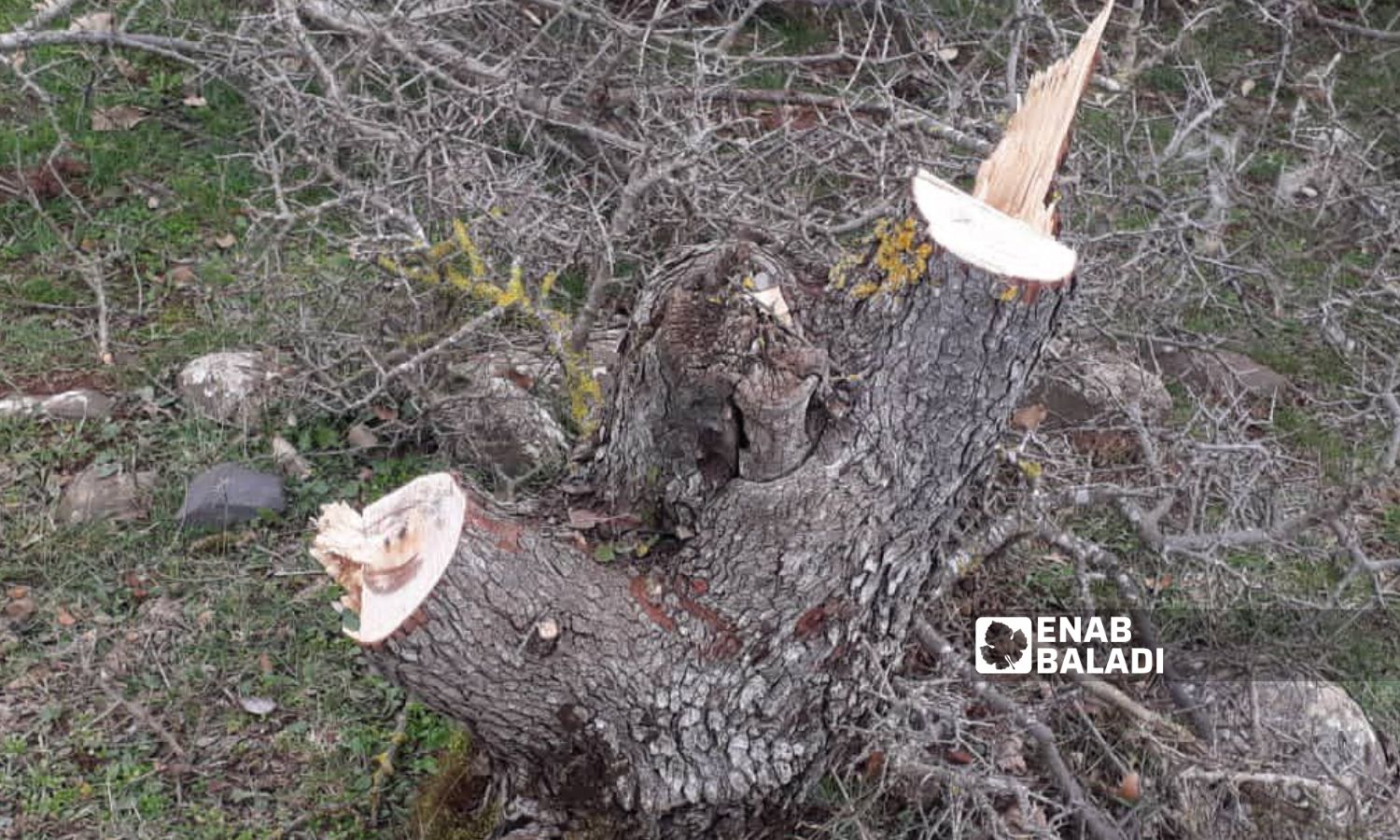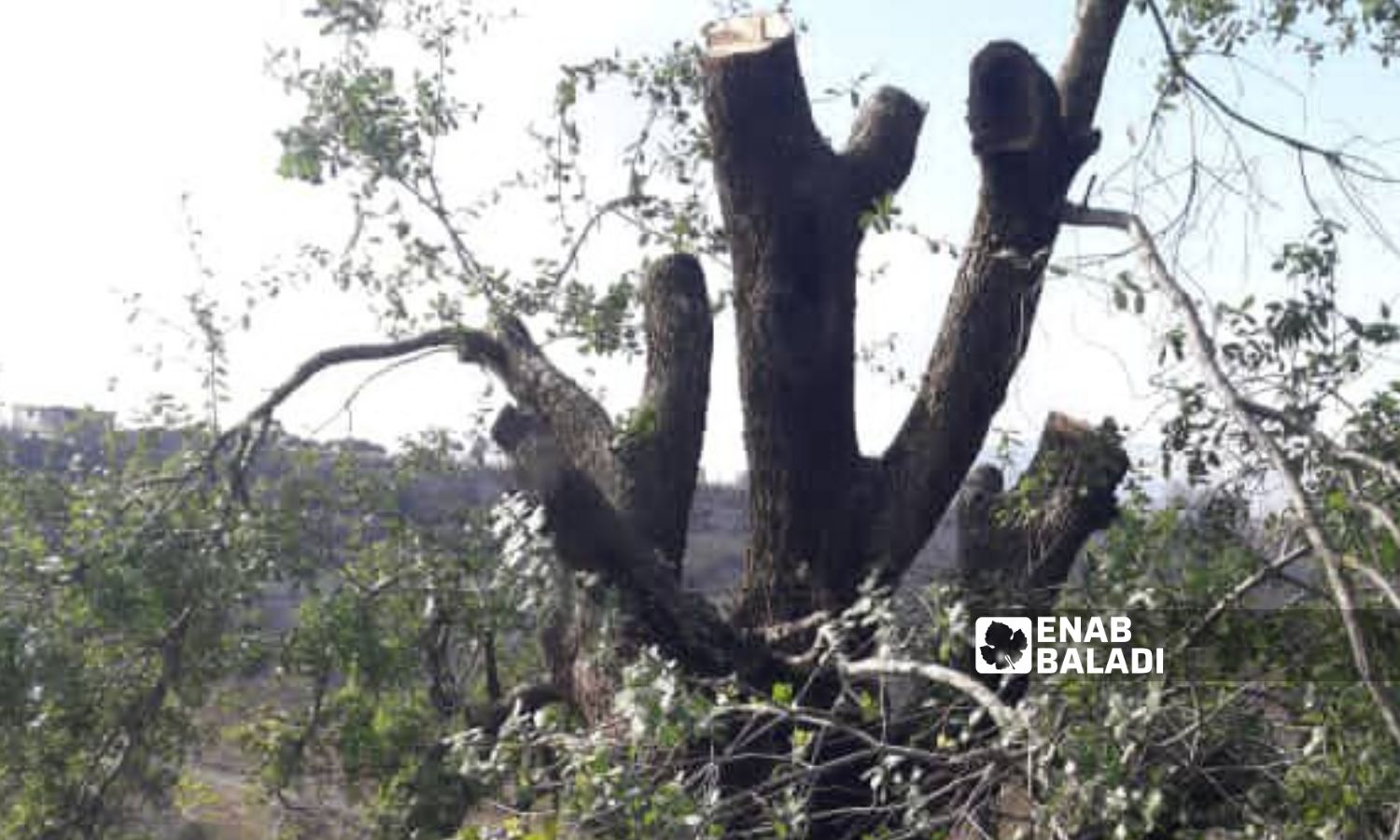



Enab Baladi – Quneitra
This year was the “worst” when the perennial trees in the Jubata al-Khashab and Trinjeh reserve in the Quneitra governorate were subjected to unjust cutting operations during the winter season, according to the testimonies of the residents.
The unprecedented increase in logging operations was accompanied by the inability of local efforts and those operating in the region to put an end to it.
The presence of specialized bodies and teams to protect this forest, such as the “Forest Police Station” of the Quneitra Agricultural Directorate, in cooperation with a committee of the area’s residents, did not stop this.
The majority of perennial tree cutting operations take place after midnight, during which thick and tall trees, which weigh tons and are dozens of years old, are cut down, resulting in abundant quantities and large weights of firewood.
An officer in the al-Hiraj (Forest) Police Station (who asked not to be named for security reasons) told Enab Baladi that, on the morning of 5 January, he was surprised that about 40 perennial oak trees were cut down, each 17 meters long and more than 60 centimeters in diameter.
The officer explained that the trees were cut down and transported to the town of Hader, adjacent to the forest (north of the forest), as it is considered the main center for collecting firewood, and its merchants are known for distributing firewood and selling it towards the governorates of Daraa and the countryside of Damascus.
He stated that the protected area, which amounts to 133 hectares of various types of trees, such as oaks, hawthorns, wild plum trees, and others, is threatened with unjust logging unless officials and the townspeople find a “deterrent solution.”
The logging operations continue on a daily basis without serious measures to prevent them, according to what was monitored by Enab Baladi’s correspondent in Quneitra and according to the officer’s testimony.
The “police station” works to write down the records and send them to the Quneitra Agriculture Directorate, in addition to photographing the felling of trees, but these procedures do not prevent the cutting operations.
The Jubata al-Khashab and Trinjeh reserve is a forested natural reserve, and one of the most important tourist attractions in Quneitra, and a destination for tourists coming from various Syrian governorates. It is located on the southern slope of Mount Hermon heights from the northern side of Quneitra. It is about 1100 meters above sea level.

The trunk of a tree that was cut down in the Jubata al-Khashab Reserve in southern Quneitra governorate – 6 January 2023 (Enab Baladi)
Traders buy one ton of green firewood at a price of 650,000 Syrian pounds (about 108 US dollars).
Abu Ahmed, of Jubata al-Khashab town, told Enab Baladi that the residents who cut down trees and sell them are a group of young men called “crisis traders” for the purpose of profit, and some “drug addicts,” to buy narcotics with the price of their firewood.
Abu Ahmed added that the tree cutting process this year is worse than previous years, which threatens the future of the reserve’s trees, pointing out that the people do not know how to stop the cutting operations “without bloodshed,” as he described.
A resident of the town of Trinjeh, and a member of the committee that accompanies the foresters during their work, spoke to Enab Baladi about the need for people to unite with the concerned authorities, and to develop plans to limit the process of cutting and selling trees, even if the authorities are forced to use force.
He added that night patrols should be conducted, entry to the forest should be prohibited during the night period, barriers should be placed at the entrances and exits of the forest, and fines should be written for those carrying cutting tools inside the forest, even if they were primitive tools.
He noted that the local residents were allowed to log under the supervision of the committee, and they took their needs earlier.
“All the people have taken enough firewood for the current year, and they do not need firewood for heating, and everyone who enters the forest today aims to cut down trees and sell them,” he assured.
Every winter, the reserve is subjected to unjust cutting operations accompanied by warnings from the concerned committees to protect it and initiatives by the people to stop it.
The reserve remained steadfast in the face of logging through the years of war, with local efforts that prevented deforestation, supervised and monitored the method of cutting trees, and took care of pruning them.
The Syrian regime and the Lebanese Hezbollah group encouraged the cutting down of forest trees and disposing of them, as barriers were opened in front of firewood merchants who cut down tons of trees and take them out to neighboring villages and towns, such as the town of Hader, or to the province of Daraa, according to Enab Baladi’s correspondent in Quneitra governorate.
At the time, he pointed out that the people of Hader, whose village is located on the northern side of the forest, which is close to their agricultural lands, cut down trees in order to expand their agricultural lands without being held accountable by the relevant government agencies.
In a statement by the Directorate of Agriculture in Quneitra governorate in 2018, it said that large areas of natural and industrial forests were damaged as a result of encroachments and unjust cutting.
According to the annual industrial reforestation plan, the directorate explained that after examining all the damaged natural and industrial forest sites, it needed three years to restore them to their normal state and that the forest sites’ need for trees and plants to return to their previous state was estimated at about 180,000 forest and fruitful plants.
In 2018, the Directorate of Agriculture estimated the damage to natural forests and forest sites in Quneitra as a result of the war, and the costs of their restoration and rehabilitation, at about 552 million SYP.
if you think the article contain wrong information or you have additional details Send Correction